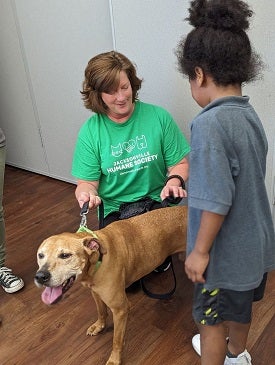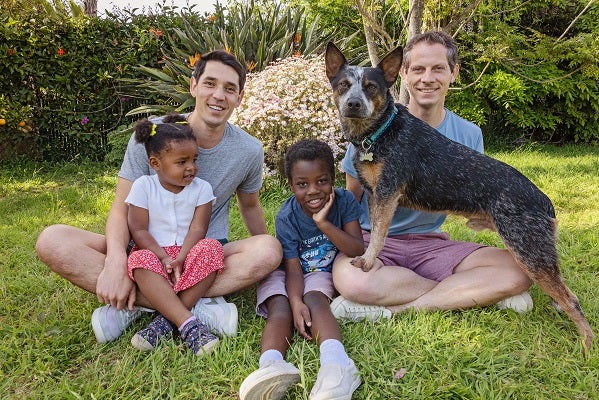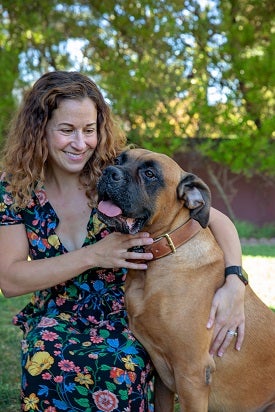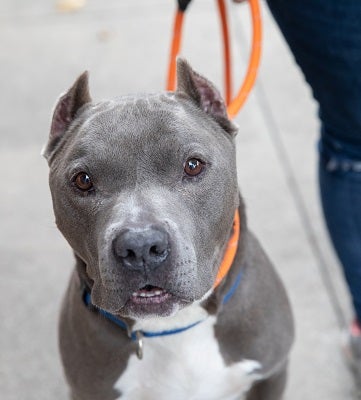
Legislation is poised to end BSL in Florida
May 31, 2023
Siberian Huskies. Rottweilers. Pit bull terrier-type dogs. Lovers of these breeds—not to mention dozens more (even, absurdly, pugs)—have long been unable to legally reside in specific communities around the country. Such restrictions often stretch to dogs above a randomly chosen size limit, too. When countless canines have no place to call home, their people naturally don’t, either. What’s left is an impossible choice between giving up a beloved family member or moving someplace without such restrictions.
The first choice is sadly quite common: Our 2018-2020 Pet Owner Surrender data shows that housing barriers were the number one reason for surrender to shelters. And the second option is out of reach for people whose lower economic means limit their ability to afford often more expensive pet-friendly housing. That is, of course, if they can even find such housing. Plus, many property owners and insurance companies set policies based on breed, too.
With the help of many organizations and individuals around the country, Best Friends Animal Society is diligently working to eliminate breed-specific legislation (BSL) in government facilities, cities, and counties. We recently concentrated our efforts on eliminating BSL in Florida’s Miami-Dade County and the city of Sunrise in Broward County. The exciting news? Those efforts are poised to become a reality. Florida’s House of Representatives has unanimously passed Senate Bill 942 (SB 942), which now sits on the desk of Governor Ron DeSantis awaiting his signature.
“We are so grateful to Senator Alexis Calatayud, the bill’s sponsor in the Senate, and Representative Demi Busatta-Cabrera, our sponsor in the House, for their leadership on this issue,” says Kelsey Gilmore-Futeral, legislative attorney for Best Friends Animal Society. “We are pleased it will soon be before Governor DeSantis and look forward to his signing into law more protections for people with well-behaved big dogs. Florida’s progress on this issue could ultimately lead to change beyond state borders.”
Why Florida?
 The reasons for choosing the Sunshine State are numerous. First, our 2021 data set places Florida among the top five states where the most animals are still losing their lives in the sheltering system. Removing barriers to ownership would give every animal welfare organization in the state the ability to advocate for all dogs in their care. Second, the presence of BSL in government-funded housing presents an ideal gateway to change. A survey of Public Housing Authority pet policies across Florida found that 60% had breed restrictions; 100% of the policies we reviewed restricted pets to under 40 pounds.
The reasons for choosing the Sunshine State are numerous. First, our 2021 data set places Florida among the top five states where the most animals are still losing their lives in the sheltering system. Removing barriers to ownership would give every animal welfare organization in the state the ability to advocate for all dogs in their care. Second, the presence of BSL in government-funded housing presents an ideal gateway to change. A survey of Public Housing Authority pet policies across Florida found that 60% had breed restrictions; 100% of the policies we reviewed restricted pets to under 40 pounds.
“We literally have people living in cars with their dogs,” says Denise Deisler, CEO of Jacksonville Humane Society (JHS). “These are people who are often eligible for government housing, but they won’t take advantage of that option because it rules out an important part of their life.”
Third, the state set a precedent in 1990 when it prohibited local governments from passing new restrictive ordinances. This preemptive legislation provides a perfect opportunity to challenge still-existing exceptions to that law.
“The ordinances in Miami-Dade County and Sunrise remain in place because their legislation was enacted prior to 1990, however our argument is that the state-level statute should preempt government-funded housing from BSL,” says Best Friends Senior Director of Legislation and Advocacy Laura Donahue. “BSL in these communities has profoundly affected people's abilities to live there with their existing family when that family includes one of the many dogs lumped into the categories delineated in the restrictions. It's affected so many people and animals that Florida has continued to be a priority for us.”

What will SB 942 do?
The bill awaiting passage applies to Florida counties, cities, and 100% of government-funded public housing authorities and prevents them from adopting ordinances or policies designating a dog as dangerous based solely on breed, weight, or size. A similar bill was passed in Texas this year, but it does not include weight or size among the criteria. Those additional categories were actually added to the Florida bill by Representative Busatta Cabrera.
“She is passionate about this issue and insisted on including all other arbitrary markers for housing restrictions,” Kelsey says.
 Representative Busatta Cabrera is not the only legislator to play a crucial role in progressing the bill, nor is this the first attempt at getting such legislation passed. A previous pass at a BSL bill in 2022 created many advocates in the House and Senate and paved the way for this year’s success.
Representative Busatta Cabrera is not the only legislator to play a crucial role in progressing the bill, nor is this the first attempt at getting such legislation passed. A previous pass at a BSL bill in 2022 created many advocates in the House and Senate and paved the way for this year’s success.
“Last year’s bill unanimously went through the Senate and two House committees before we ran out of time on the House floor,” Kelsey says. “But that put us in a great position to return in 2023 with a bill that many legislators had already voted yes on. We were met with quite a warm reception when we came back to work the bill this year.”
Dahlia Canes, director and founder of the Miami Coalition Against BSL (MCABSL), tips her hat to legislators who have supported a change to BSL for years.
“I definitely want to give credit to the many people who have supported such change since 2012, including former Miami-Dade County commissioners Sally Heyman and Jose ‘Pepe’ Diaz, who is now mayor of Sweetwater, Florida,” Dahlia says. “There also are so many supporters at Miami-Dade Animal Services. We previously previewed a short film about the impact of BSL on them. Not only did it get a standing ovation, but people had tears in their eyes.”
Collaboration between animal welfare organizations was fundamental to getting the bill to the finish line, too.
“Best Friends kept other organizations up to date, which allowed us to distribute the information to leaders in the state and make sure they understood the legislation and took the time to chime in,” says JHS’s Chief Operating Officer Lawrence Nicolas. “They communicated in a fashion that allowed the citizens in Florida to step forward and speak their mind on the issue.”
“This is a perfect example of how we can leave our differences behind and focus on what's important, which is the animals themselves,” Dahlia adds.
What strategies can you use to tackle BSL?
Other communities advocating for similar change can employ the strategies followed in the Florida case. For starters, Kelsey advises animal welfare organizations to build a coalition but select one to have the strongest voice. You don’t want to overwhelm lawmakers with too many people or with conflicting messages, and make sure your arguments are framed around what your audience considers important.
 “Some lawmakers are very concerned about affordable, stable housing and we can point to how breed-neutral laws remove one of the biggest barriers to that,” Kelsey says. “Others are concerned about preserving personal property rights and reducing government interference in personal choices. This type of bill appeals to that audience as well.”
“Some lawmakers are very concerned about affordable, stable housing and we can point to how breed-neutral laws remove one of the biggest barriers to that,” Kelsey says. “Others are concerned about preserving personal property rights and reducing government interference in personal choices. This type of bill appeals to that audience as well.”
That’s not to say arguments against BSL shouldn’t also include what veterinarians, animal behaviorists, dog breeders, animal sheltering organizations, and the dog rescue community all know to be true: you can’t judge a book by its cover.
“Science is clear and has been for decades: breed does not determine behavior,” Laura says. “Having the backing of many experts in canine behavior creates overwhelming support against BSL and goes a very long way toward mitigating any opposition. We also know that good dangerous dog laws based upon behavior, not how a dog looks, are what keep communities safe.
“This is why Best Friends partners with the International Municipal Lawyers Association to create model policies for local governments around dangerous dogs,” she continues. “This legislation does not impact local government’s ability to create good, sound policies. It simply removes outdated laws that unnecessarily separate pets from their people.”
“It was smart of Best Friends to approach the issue from the angle of discrimination in federal and state-subsidized housing,” Denise says. “This is an important first step in setting a standard that private landlords and property owners will hopefully follow suit on. We won’t be removing all the barriers for those dogs, but housing is an important one. SB 942 opens the door that much wider for all dogs to someday get the homes they deserve.”
Go here for more information about how your organization as well as private advocates in your community can take action and show their support for responsible dog owners. Additional information about why BSL is ineffective can also be found on our main website.

Liz Finch
Senior Writer
Best Friends Network
If you enjoyed this program spotlight, you can find our complete catalog of spotlights here.